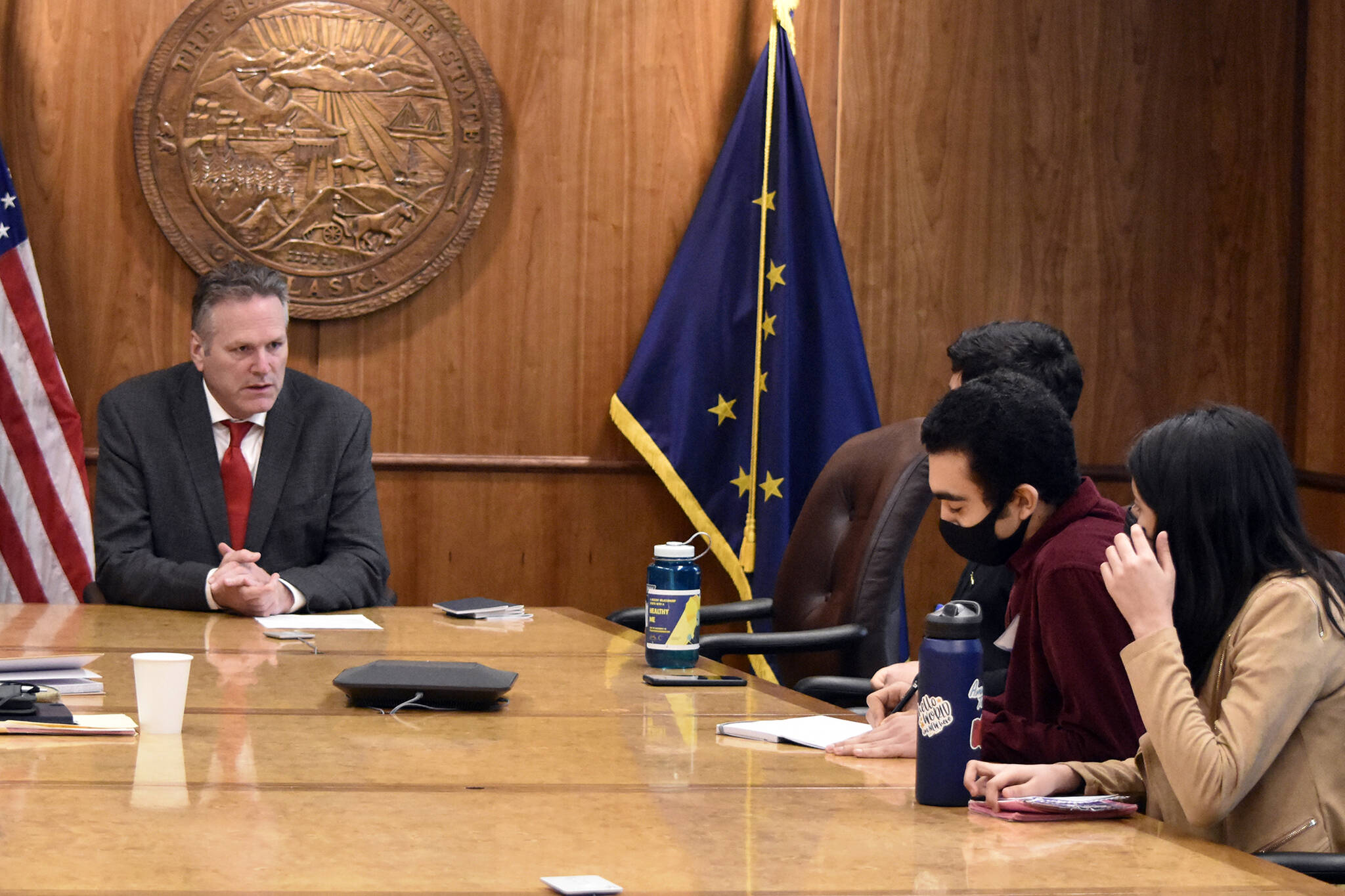Seventeen-year-old Sharon Shabon said she was a little disappointed to find out her international exchange program would be sending her from her home in Malindi, Kenya, to a place she’d never heard of called Sitka, Alaska. But after several months — including winter months — Shabon said it’s going to feel strange to leave.
What will she miss the most?
“I have done so many things in the U.S., I cannot choose,” Shabon said.
Shabon is part of a group of international students who’ve spent the last academic year in Alaskan high schools and on Wednesday, March 26, she and four other students staying in Southeast Alaska visited the Alaska State Capitol. Shabon and her fellow students Ahmed Raza from Bahrain and Mohammed Alnayhoum from Lybia are getting ready to finish the year at Sitka High School. Abira Raza (no relation) from Pakistan is attending Thunder Mountain High School and Arman Mkrtchyan from Armenia is at Juneau-Douglas High School: Yadaa.at Kalé
They’ve come to America through AFS Intercultural Programs which brings students from around the globe and is sponsored by the U.S. State Department, according to Krisanne Rice, a local volunteer. The students were among a handful of students to be selected from their countries out of thousands of applicants, Rice said, and must be strong students and active in their communities.
[Looking at next 50 years of ANCSA, Native corp leaders stress commitment to place]
The students were at the Alaska State Capitol on Wednesday, March 16, where they met with Gov. Mike Dunleavy and spent time with lawmakers. Though all of the students mentioned being taken aback at the weather, and not enjoying the cold, the dark and the rain of Southeast Alaska in the wintertime, they were universally effusive in their praise for the communities they’ve been living in.
“I’m ready to explore more of Alaska,” said Ahmed Raza, who’s about to finish his senior year. “In time I’ll be ready to leave.”
The students said they were surprised at the lack of school uniforms but pleased — mostly — by the wide variety of foods available at school cafeterias. Vegetarians Abira Raza and Mkrtchyan said much of the food on offer was meat-based, but also said cafeteria staff would help them, and Shabon mentioned school egg rolls with a derisive tone.
Before coming to the U.S., the students’ ideas about America were colored by movies and T.V. but said there was less drama in real life than in teenage soap operas.
“I think it’s kinda dramatic,” Alnayhoum quipped.
The fact that Sitka High School doesn’t have an “American football” team was a disappointment to Shabon.
“I have watched so many movies,” she said, shaking her head in disbelief.
All the students said there was a greater focus in America on school sports and extra-curricular activities. Most youth sports leagues in their home countries were part of the private sector, they said.
In Pakistan, “more people would devote themselves to academics more than sports,” Abira Raza said.
But those extra activities gave them opportunities they wouldn’t have had in their home countries. Both Shabon and Alnayhoum are participating in mock trial, something they said doesn’t exist in their home countries of Kenya and Lybia.
The students said they also appreciated the diversity of American culture and the openness of the society.
“I enjoyed meeting people with different sexualities and religions,” Shabon said. “In my country, you’re either male or female, that’s it.”
Shabon said one of her friends was expelled from her school because she was a lesbian.
There was a wider availability of foods here too, though students said that much American food was over-processed.
“I am from Asia, but I came to the U.S. to discover Asian food,” Mkrtchyan, who’s from Armenia, said.
The students all expressed an appreciation for salmon and halibut but also said American cuisine could use more spice.
The students arrived in August or September last year and will be leaving in early June. All of them complained that it will be hot in their home countries and all of them said they’ll miss their host families and friends they’ve made. New students will be coming in the fall, and Rice said AFS is looking for host families in Juneau.
“For a vibrant international exchange program we need host families,” Rice said. “Juneau is looking for three families who would welcome a student in their home and volunteers for intercultural exchange.”
AFS volunteer Amelia Jenkins said organizations interested in meeting with the students for cultural exchange should contact her. Those interested in working with AFS can go to AFSusa.org or call Jenkins at 907-321-2694.
• Contact reporter Peter Segall at psegall@juneauempire.com. Follow him on Twitter at @SegallJnuEmpire.

